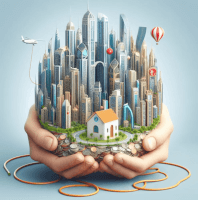
Beyond Building Walls: How Charitable Efforts are Shaping the Future of UAE Development
The UAE is experiencing a rapidly expanding real estate market, with tall buildings and high-end properties constantly reshaping its cityscape. However, amidst this rapid development, there is also a growing emphasis on philanthropy and giving back to communities in need. Philanthropy plays a significant role in the region’s culture and traditions, making it an integral part of the real estate industry as well. In recent years, we have seen an increase in charitable initiatives incorporated into real estate projects, showcasing not only impressive architectural feats but also a commitment to social responsibility and sustainable development. This trend highlights the importance of incorporating philanthropy into real estate development for both economic growth and societal impact.
Philanthropy in Real Estate Development
In the UAE, we have witnessed a number of real estate projects that incorporate philanthropy as an integral part of their development. One notable example is Mohammed Bin Rashid City (MBR), a mega-development that spans over 55 million square feet and aims to create a sustainable community for its residents. MBR not only boasts luxurious residential units but also includes charitable initiatives such as Dubai Cares’ “Volunteer Emirates” program, which promotes volunteerism among residents and visitors.
Another prominent project is the Sustainable City in Dubai, which focuses on promoting environmental sustainability through green buildings and renewable energy sources. This development also incorporates social responsibility by providing affordable housing for low-income families and allocating 50% of its land for public parks and gardens.
Apart from these large-scale developments, many individual developers are also making efforts towards philanthropic initiatives in their projects. For instance, DAMAC Properties launched AED10 million fund called “DAMAC Foundation” to support various charitable causes globally. Similarly, Emaar Properties has established multiple foundations focusing on education, healthcare, and community development.
The incorporation of philanthropy in real estate development brings numerous benefits to both developers and society at large. Firstly, it creates a positive image for the developer as they are seen as socially responsible entities dedicated to giving back to communities in need. This can attract potential buyers or investors who value companies with strong ethical values.
Moreover, incorporating philanthropy in real estate projects can benefit society by addressing pressing social issues such as poverty alleviation or access to education and healthcare facilities. These initiatives not only improve the lives of individuals but also contribute towards creating more inclusive communities.
Incorporating charitable initiatives into real estate developments can lead to economic growth by stimulating local economies through job creation and increasing property values in surrounding areas.
The trend of incorporating philanthropy into real estate development reflects the UAE’s commitment towards creating sustainable communities while upholding its cultural values of giving back and promoting social responsibility. This approach not only benefits the developer but also contributes towards creating a more inclusive and sustainable society.
Impact
Sustainability and Social Responsibility
One of the main impacts of philanthropy in real estate development is its contribution towards creating sustainable communities. Developers who incorporate environmentally friendly practices and promote resource conservation not only benefit the environment but also improve the quality of life for residents. For instance, developments that use renewable energy sources or implement green building standards can reduce carbon emissions and promote a healthier living environment.
In addition to environmental sustainability, incorporating social responsibility into real estate projects can have a significant impact on addressing social issues within communities. For example, providing affordable housing for low-income families can help alleviate poverty and improve access to education and healthcare facilities.
Philanthropic initiatives in real estate development have a ripple effect on society by encouraging individuals to participate in charitable activities and promoting volunteerism. This creates a sense of unity and community engagement among residents, ultimately leading to stronger, more inclusive societies.
Incorporating philanthropy into real estate projects also has economic benefits. By investing in local communities through job creation or supporting small businesses, developers contribute towards economic growth at both the micro and macro levels. This not only boosts employment opportunities but also increases property values in surrounding areas.
As consumers become increasingly conscious about ethical practices and corporate social responsibility efforts by companies they support, incorporating philanthropy into real estate development becomes crucial for attracting potential buyers or investors. It helps build trust with stakeholders and establishes long-term relationships based on shared values.
Integrating sustainability principles along with social responsibility initiatives into real estate development is essential for creating thriving communities that prioritize both economic growth and societal well-being. The UAE’s commitment towards this approach reflects its forward-thinking mindset as it continues to lead the way in innovative sustainable development strategies.
Collaboration with Non-Profit Organizations
The growing trend of incorporating philanthropy into real estate development in the UAE has also led to an increase in partnerships between developers and non-profit organizations. These collaborations have proven to be successful in addressing various social issues while creating sustainable communities.
One example is the partnership between Emaar Properties and Dubai Cares, a global charity organization focused on improving access to quality education for children in developing countries. Emaar Properties has pledged AED17 million towards funding Dubai Cares’ programs, including building schools and providing school supplies for underprivileged children.
Similarly, DAMAC Properties has partnered with Emirates Red Crescent, a humanitarian organization that provides aid and support to vulnerable communities around the world. Through this collaboration, DAMAC Properties has contributed towards supporting refugees through initiatives such as building homes and providing basic necessities like food and water.
These partnerships offer both financial assistance and the expertise of developers in construction and project management to assist charitable causes. This enables non-profit organizations to achieve their objectives more effectively while demonstrating the positive impact of these collaborations on society.
These partnerships go beyond monetary contributions. Many real estate developers engage their employees in volunteer work with partnering non-profits as part of their corporate social responsibility efforts. This not only contributes towards employee engagement but also creates a sense of pride among staff members who are given opportunities to give back through their work.
These collaborations create opportunities for knowledge sharing between different sectors. Non-profit organizations bring valuable insights into community needs and challenges which can help inform real estate developments that aim at promoting sustainability and social responsibility.
Partnerships between real estate developers and non-profit organizations have proven beneficial for both parties involved as well as society at large. By working together towards common goals, they showcase how business success can go hand-in-hand with giving back to communities in need.
Marketing and Branding Opportunities
Philanthropy in real estate development not only has a positive impact on society, but it can also enhance a company’s brand and reputation. By incorporating social responsibility initiatives into their projects, developers showcase their commitment to making a meaningful difference in the communities they operate in. This can significantly improve their public image and create a strong brand identity based on ethical values.
Consumers are becoming increasingly conscious of the companies they support and prefer businesses that align with their own values. By incorporating philanthropy into real estate development, companies can attract socially responsible buyers or investors who prioritize ethical practices.
philanthropic efforts have been proven to increase customer loyalty as people tend to gravitate towards brands that give back to society. This translates into long-term relationships with customers who not only value the quality of the product but also appreciate the company’s contribution towards creating sustainable communities.
Incorporating philanthropy into real estate development also provides opportunities for marketing and promoting a project or company. Developers can leverage these initiatives through various channels such as social media campaigns or press releases to showcase how they are making an impact beyond just building properties.
These efforts not only attract potential buyers but also differentiate the developer from competitors by highlighting its commitment towards corporate social responsibility. It creates a unique selling point that sets them apart from others in the market.
In addition to enhancing brand reputation and attracting customers, investing in philanthropic initiatives within real estate developments also has significant ROI potential for developers. These projects contribute towards improving local economies by creating job opportunities and increasing property values which ultimately lead to higher returns on investment.
By addressing pressing social issues like poverty alleviation or access to education and healthcare facilities through their developments, companies contribute towards creating more inclusive communities. This leads to improved living standards which positively impact property demand and prices over time.
Furthermore, partnerships between developers and non-profit organizations allow for knowledge sharing between different sectors which can result in innovative solutions for community problems while simultaneously creating marketing opportunities for developers.
Challenges and Solutions
One of the main challenges faced by real estate developers in implementing philanthropic initiatives is securing funding for these projects. Developing properties already requires significant financial resources and adding philanthropy to the mix can be a daunting task. Additionally, many developers may not have experience or knowledge in fundraising and may struggle to secure donations from external sources.
To overcome this challenge, developers can explore various avenues for funding such as partnering with non-profit organizations that have access to grants or seeking out private donors who are passionate about social causes. They can also consider allocating a portion of their profits towards philanthropic efforts or incorporating crowdfunding into their strategies.
Another challenge faced by real estate developers is ensuring the sustainability and long-term impact of their philanthropic projects. Many initiatives may provide temporary relief but fail to address root causes and create lasting change in communities.
To tackle this issue, it is essential for developers to conduct thorough research on community needs and work closely with local stakeholders to develop sustainable solutions tailored specifically to each community’s unique challenges. Moreover, involving community members in the planning and execution processes ensures that they are invested in the project’s success.
Balancing short-term business goals with long-term philanthropic objectives can pose a challenge for real estate developers. As businesses strive for profitability, there may be pressure to cut costs or prioritize economic benefits over social responsibility efforts.
To overcome this challenge, companies must integrate corporate social responsibility into their core values rather than treating it as an add-on. This involves developing comprehensive plans that align business objectives with charitable contributions while considering potential trade-offs between short-term profits and long-term societal impact.
while there are certainly challenges involved in incorporating philanthropy into real estate development projects, these obstacles can be overcome through strategic planning and partnerships with relevant stakeholders. By addressing these challenges head-on, and developing comprehensive plans, including philanthropy into real estate development.
Developers can ensure the success of their philanthropic initiatives while simultaneously creating positive impacts on society.
Future of Philanthropy in Real Estate Development
As philanthropy continues to gain importance in the real estate industry, experts predict that it will become an integral part of the development process rather than just an add-on. This means that developers will prioritize incorporating social responsibility into their projects from the planning stages, ensuring a more seamless integration and long-term impact.
With increasing pressure on businesses to operate sustainably and ethically, philanthropy is expected to become a key factor in attracting investors and buyers. Companies that demonstrate a strong commitment towards giving back are likely to be preferred over those solely focused on profits. As such, we can expect to see more real estate developers actively seeking out partnerships with non-profit organizations and implementing social initiatives as part of their core values.
The future of philanthropy in real estate development also holds potential for innovative solutions through technological advancements. With the rise of smart cities and sustainable building practices, developers can leverage these tools to create even greater impacts on communities they work in. For example, utilizing green technology could not only benefit the environment but also provide cost savings which can then be channeled towards charitable causes.
There is growing interest among younger generations for socially responsible investments. The millennial generation is known for valuing ethical business practices and prioritizing purpose over profit when making purchasing decisions. As this demographic becomes increasingly influential in the real estate market, we can expect to see a shift towards developments that align with their values.
In terms of impact on society as a whole, the future of philanthropy in real estate development looks promising. By addressing pressing social issues like poverty alleviation or sustainable community development through their projects, or investing in community development programs, real estate developers have the potential to make a significant difference in society.
This can lead to a more equitable distribution of resources and opportunities, creating more inclusive and cohesive communities. As such, philanthropy in real estate development has far-reaching implications for societal development and progress.
The future of philanthropy in real estate development looks promising. With its increasing importance in business practices and the potential for technological advancements to create even greater impacts, we can expect to see more integration of social responsibility into all stages of development. This has the potential to create a more sustainable and equitable future for all.
Developers have the power to create positive change at a larger scale beyond just individual properties or communities. This has significant implications for creating more inclusive societies where everyone has access to basic needs such as housing, education, and healthcare.
The UAE has been a key player in the global real estate market, with rapid development and growth in recent years. As such, it is crucial for developers in this region to recognize their role and responsibility towards creating sustainable communities.
Incorporating philanthropy into real estate development not only benefits society but also presents opportunities for developers to stand out from competitors, attract socially responsible buyers or investors, and increase customer loyalty. It also has potential for long-term ROI through improved property values and community development.
However, there are challenges involved in implementing philanthropic initiatives within the real estate industry. These include securing funding, ensuring sustainability and long-term impact of projects, and balancing short-term business goals with social responsibility efforts. By addressing these challenges through strategic planning and partnerships with relevant stakeholders, developers can ensure the success of their philanthropic endeavors.
Looking towards the future of philanthropy in real estate development in the UAE, we can expect to see an even greater integration of social responsibility into project planning and a shift towards more sustainable building practices. Technological advancements will also play a significant role in creating innovative solutions that benefit both society and the environment.
With increasing interest from younger generations for socially responsible investments, there is great potential for positive change at a larger scale beyond just individual properties or communities. By prioritizing purpose over profit and leveraging their resources towards addressing pressing social issues such as poverty alleviation or access to education.
Developers have the power to create more inclusive societies where everyone has equal opportunities to thrive.
The importance of incorporating philanthropy into real estate development cannot be overstated. The potential for positive impacts on society as well as business benefits make it an essential aspect of any successful project. With careful consideration given to overcoming challenges faced by developers,
We can look forward to seeing continued progress towards creating sustainable communities through ethical practices within the real estate industry.






